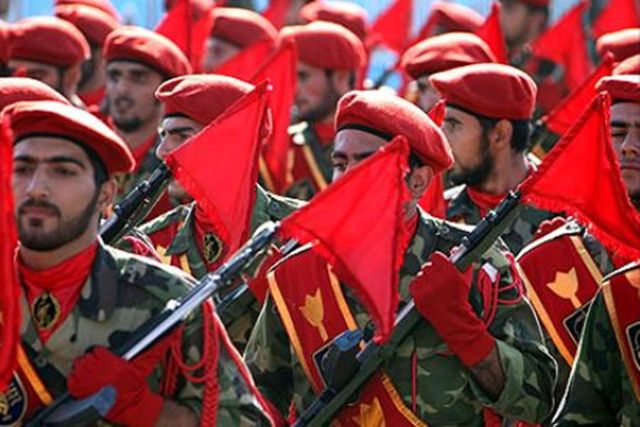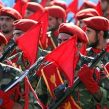
Probing the Reasons behind Iran’s “Pre-emptive” Military Offensive against Kurdish Rebels
Publication: Terrorism Monitor Volume: 9 Issue: 36
By:

Iranian military forces began a large-scale and ongoing offensive in the northwestern part of the country in early July. The target of the operation is the militant Kurdish group Partiya Jiyana Azad a Kurdistane (PJAK – Party of Free Life of Iranian Kurdistan), a group that emerged in 2004 and has repeatedly carried out attacks against Iranian security forces and economic infrastructure assets such as gas pipelines in Iran’s Kurdistan and West Azerbaijan provinces. PJAK’s operational bases have from the outset been located in Iraqi regions that are nominally under the jurisdiction of the Kurdish Regional Government (KRG), a reality that has always given this Iran-PJAK conflict a significant regional dimension, particularly now when the entire Middle East is experiencing considerable political instability.
Why Has Iran Chosen This Time for a Military Offensive?
Tehran has justified this latest offensive against PJAK by citing general security considerations and referring to the need to “cleanse the region of terrorists,” but has otherwise been cryptic about its precise objectives. The main question that needs to be answered relates to the timing of this latest Iranian military offensive against PJAK, given that the group has not changed its strategy in any major way or escalated its attacks from previous years.
Press TV, the Iranian regime’s principal English-language outlet, commented that the offensive had been launched in July after PJAK had been given a “one-month grace period to pull its forces out of Iranian territory” but had refused to comply with the ultimatum (Press TV, September 13). Other Iranian sources stated that the “grace-period” came in the middle of the campaign to coincide with the month of Ramadan (1-30 August) when Tehran claimed it would cease military operations in respect of the holy Muslim month (Fars News, September 20).
The head of the Islamic Revolutionary Guards Corps (IRGC), Mohammad Ali Jaffari, stated that the forces under his command had acted in a “pre-emptive” fashion to counter what he called “extensive schemes” against the Islamic Republic (Press TV, September 13). Jaffari did not elaborate on the nature of the alleged plots, but like many other Iranian officials before him, Jaffari alleged that the United States is backing the PJAK militants.
Sadullah Zarei, a prominent political figure close to the IRGC suggested the timing of the anti-PJAK military campaign was tied to the Kurdish group’s most recent political maneuverings. Zaeri, calling PJAK an entity that was originally “launched to pave the way for the U.S. occupation of Iran,” said the group had opted “to turn itself into the Iranian Kurdish peoples’ principal voice” last January-February (Gerdab, September 3).
According to this official line of argument, PJAK chose to change tactics at this time and instead of pursuing an armed rebellion it turned to Tehran with a plea for negotiations in the pursuit of political goals and concessions from the Islamic Republic. Zaeri did not refer to any other realities as catalysts for the timing of the IRGC’s offensive – such as the onset of the Arab Spring, political volatility across the region or the scheduled U.S. military withdrawal from Iraq by the end of 2011. However, the January-February timeframe which Zaeri highlights coincides far more with heightened regional unrest and fears in Tehran about a spill-over into Iran than it does with any shift in PJAK strategy. In fact, PJAK’s political overtures toward the authorities in Tehran were evident before early 2011; as early as October, 2010 the group presented a manifesto on its website which argued the shift in policy was designed to jumpstart a process toward political settlement (Pjak.org, October 19, 2010). In this regard, IRGC commander Jaffari’s statement about the latest anti-PJAK campaign being one of “pre-emption” driven by evolving regional security conditions appears more plausible than the argument that PJAK was reinventing itself and therefore needed to be neutralized once and for all.
PJAK’s Efforts to Secure Political Legitimacy
Iranian officials have escalated the public relations drive to denounce PJAK as a movement comprised of fighters from neighboring countries, primarily Kurds from Turkey, Syria and Iraq. In this context, PJAK is said not to be against “the Islamic Republic, but against Iran” (Gerdab, September, 3). Clearly, the intention here is to mobilize broader Iranian public opinion against PJAK. Secondly, PJAK’s latest calls for a ceasefire have been rejected by Tehran because it views such calls as a ploy by the group to transform itself from an armed group with limited sympathies among Iran’s estimated seven million Kurds into the Kurdish community’s champion. Evidently, this fear of legitimizing PJAK is the reason behind the decision to ignore the group’s ceasefire calls and the promise of its total annihilation by IRGC commanders.
The issue of securing legitimacy within the broader Iranian society is indeed an uphill task for PJAK. There is little sign of public support for PJAK from other anti-regime corners (such as Iran’s Green opposition leadership) that are usually critical of most decisions taken by the Iranian government. Opposition websites such as Kaleme and Rah-e sabz (Green Path) are nearly devoid of coverage of the conflict with the exception of situational reports. The Green opposition leadership most likely maintains such an aloof stance toward PJAK for two key reasons:
- None of the Iranian opposition leaders have at any point voiced support for PJAK or any other armed Iranian group such as Jundollah or the Mojahedin-e Khalq –e Iran (MEK – People’s Mujahideen of Iran). While it is true that political figures from the reformist opposition camp have always spoken about the need for increased political freedoms and more rights for the country’s minority populations, they have at no point backed calls for a federalist model in Iran as desired by PJAK.
- The beleaguered Green movement is already under intense pressure by the regime in Tehran and charged with sedition and collusion with Western interests. It is hardly surprising that the Green movement keeps a distance from groups such as PJAK, particularly since the Iranian regime has also begun to link PJAK with MEK, the regime’s most ardent foe (Habilian, August, 15; Fars News, September 9).
The International Dimension
Iran’s latest offensive against PJAK is not limited to Iranian territory. Iraqi Kurdish officials in Baghdad and from the KRG have repeatedly called on Iran to halt its operations inside the Iraqi Kurdish regions (Rooz Online, July 12). Iran, however, maintains that it has no other course of action since the KRG leadership refuses to disarm PJAK. One anonymous senior Iranian military commander stated that the president of the KRG, Massoud Barzani, had allocated “300,000 hectors of land” to PJAK, in effect implying that PJAK operates with the blessing of the KRG. Nazem Dabbagh, the KRG’s representative in Tehran, said “only an illiterate person could suggest such a thing” and moved on to urge the Iranian state to deal with grievances among Iranian Kurds and not seek to blame the KRG for the state of the affairs. Dabbagh accepted that PJAK operates from bases in Iraq but called this a legacy from the Saddam Hussein era and not circumstances that can be attributed to the actions of the KRG leadership (Iranian Diplomacy, 19 July).
Other Iranian reports, however, suggest that the KRG is open to Iranian pressures. For example, the IRGC-controlled Gerdab website reported that Komalah, an Iranian Kurdish nationalist party with bases in Iraqi Kurdistan, has suddenly been disarmed by KRG forces (Gerdab, September 17). Komalah has a decades-long record of activity dating back to the time of the Shah of Iran, although Gerdab claimed it had been mostly active in northern Iraq since the coming of the Islamic Republic 1979. There has been no independent corroboration that Komalah has been disarmed, but if true it will substantiate the argument that by using force against PJAK, Tehran has forced a rethink of policies in KRG circles.
The recent cooling in relations between Turkey and Iran might also explain the timing behind the anti-PJAK operations. This past summer Turkey carried out attacks against militant Kurds in northern Iraq. Though Iran and Turkey have increasingly collaborated on the issue of Kurdish militancy since the ruling Adalet ve Kalkınma Partisi (AKP – Justice and Development Party) came to power in 2002, it is far from clear from the present heightened relations between Tehran and Ankara whether the respective Turkish and Iranian offensives are part of a bilateral agreement between the two countries. In fact, some of the commentary in the Iranian media suggests the opposite. For example, in his interview Sadullah Zarei interestingly made a major distinction between PJAK and the Partiya Karkeren Kurdistan (PKK – Kurdistan Workers’ Party), which tends to focus only on Turkish targets. Zaeri went as far as saying that PJAK is a novice entity whereas PKK has “the backing of Turkey’s 15 million Kurds.” Perhaps the “pre-emption” that IRGC commander Jaffari spoke about relates to Iran’s desire to prevent militant Kurds fleeing Turkish bombardments from entering Iran. What is certain, however, is that the KRG and groups such as PJAK and PKK will face an entire set of new operational circumstances if the U.S. military withdraws from Iraq by the end of 2011 as currently planned, giving Turkey and Iran a considerably freer hand to pursue their agendas.





